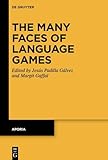The Many Faces of Language Games / ed. by Jesús Padilla Gálvez, Margit Gaffal.
Material type: TextSeries: Aporia ; 14Publisher: Berlin ; Boston : De Gruyter, [2024]Copyright date: 2025Description: 1 online resource (V, 183 p.)Content type:
TextSeries: Aporia ; 14Publisher: Berlin ; Boston : De Gruyter, [2024]Copyright date: 2025Description: 1 online resource (V, 183 p.)Content type: - 9783111575353
- 9783111577722
- 9783111577562
- 401
- online - DeGruyter
- Issued also in print.
| Item type | Current library | Call number | URL | Status | Notes | Barcode | |
|---|---|---|---|---|---|---|---|
 eBook
eBook
|
Biblioteca "Angelicum" Pont. Univ. S.Tommaso d'Aquino Nuvola online | online - DeGruyter (Browse shelf(Opens below)) | Online access | Not for loan (Accesso limitato) | Accesso per gli utenti autorizzati / Access for authorized users | (dgr)9783111577562 |
Frontmatter -- Table of Contents -- Vindicating Language Games: An Introduction -- The Non-Epistemic Model of Certainty in Wittgenstein’s Perspective -- How Do Language Games Work? -- Wittgenstein’s Concept of Language Games from a Linguistic and Analytical Perspective -- Language Games, Unresolved Problems -- Are Beliefs Social Realities? -- Chess and Chess960: Language Games, Forms of Life, and Negotiation -- Abbreviations of Wittgenstein’s Works -- List of Contributors -- Index of Names -- Subject Index
restricted access online access with authorization star
http://purl.org/coar/access_right/c_16ec
Wittgenstein used the concept of language games to refer to all forms of linguistic expression in practical contexts and to the myriad ways in which signs are used in language. He used the term to specify speaking as an activity and to relate it to a form of life. Wittgenstein was well aware that his proposal for “language games” did not solve the central problems of language. Until today, the essential characteristics of the concept remain unspecified. The contributors in this volume analyze the reasons for the difficulties in understanding the concept and propose new essential characteristics and contents, by examining language games such as certainty and error, belief, strategy, and their linguistic foundations.
Issued also in print.
Mode of access: Internet via World Wide Web.
In English.
Description based on online resource; title from PDF title page (publisher's Web site, viewed 20. Nov 2024)


